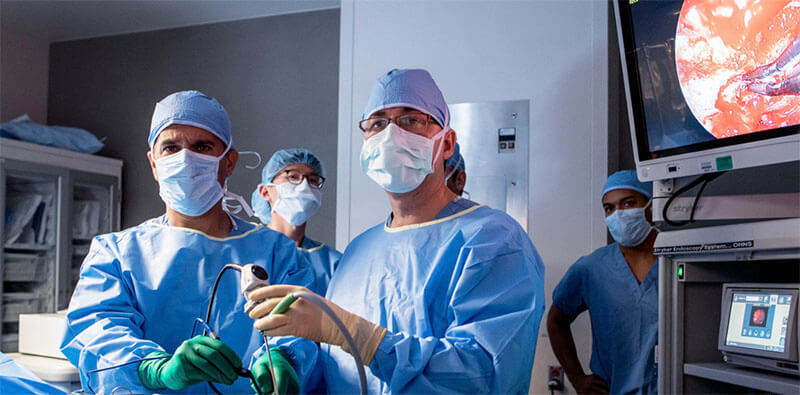Anterior Skull Base Surgery

Minimally Invasive Skull Base (MISB) surgery uses endoscopes to operate through the natural orifice of the nasal cavity to remove tumors or repair defects of the anterior skull and lateral skull base. This often avoids larger facial incisions of traditional craniotomy approaches.
Conditions and Treatments
The UCSF minimally invasive anterior skull base team treats a wide range of conditions, including both benign and malignant tumors, as well as non-tumor conditions affecting the skull base.
Benign tumors they manage include angiomas, angiofibromas, chondromas, craniopharyngiomas, epidermoids, hemangiomas, inverting papillomas, meningiomas, neurofibromas, osteomas, and pituitary tumors. These are typically removed surgically, often using endoscopic techniques through the nose, though open approaches may be necessary for larger or hard-to-reach tumors.
Malignant tumors treated by the team include adenocarcinomas, adenoid cystic carcinomas, chondrosarcomas, chordomas, hemangiopericytomas, metastatic cancers, olfactory neuroblastomas, osteosarcomas, rhabdomyosarcomas, and squamous cell carcinomas. Treatment for these often involves a combination of surgery, chemotherapy, and/or radiation, determined on a case-by-case basis by a multidisciplinary tumor board.
Additionally, the team manages non-tumor conditions such as cerebrospinal fluid leaks, encephaloceles, meningoceles, optic nerve compression, and osteomyelitis. These are typically treated surgically, often using tissue from the patient's nose or other materials to repair skull base defects. In cases of infection, antibiotics are prescribed in collaboration with infectious disease specialists.
International Consensus Statement on Allergy and Rhinology: Sinonasal Tumors with contributing author Ivan El-Sayed

